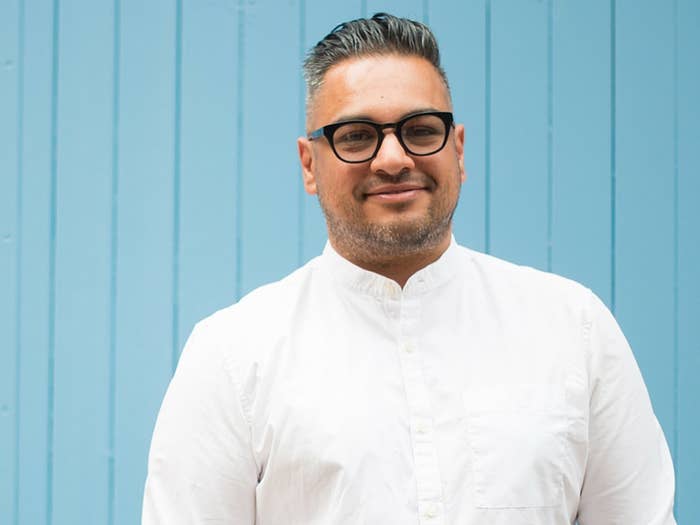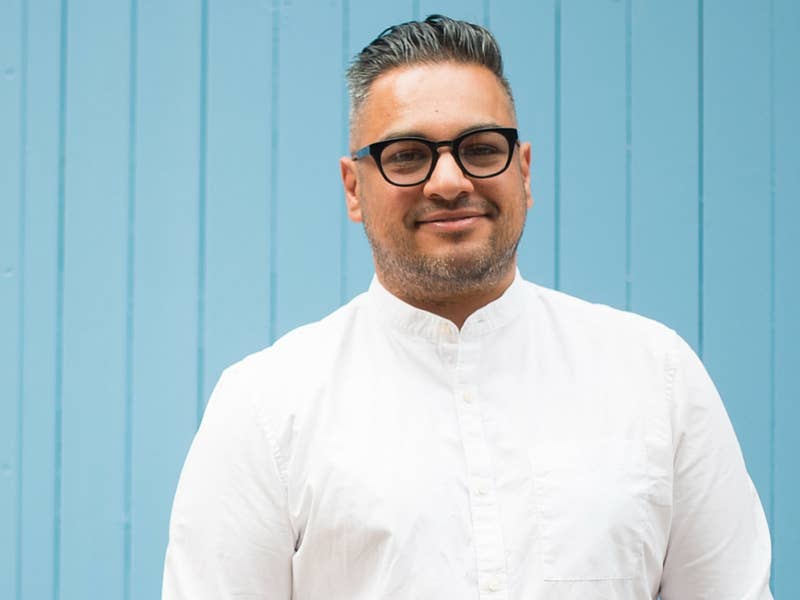
I have discovered a new word: subaltern, adjective, meaning 'of lower status'. It's also the word used by a branch of postcolonial study, which seeks to uncover a history from below. It's a word that feels particularly relevant to Nikesh Shukla’s The Good Immigrant which showcases a British subaltern narrative by bringing together the experiences of Black, Asian and Minority Ethnic (BAME) people via a collection of essays, that would otherwise probably have been lost in the swathe of predominantly white print journalism. The book’s strength not only comes in its numbers, but through the uniqueness of each essay inside, ranging from Coco Khan’s look at sexuality and fetishisation, through to Riz MC’s retelling of his typical treatment in airport security.
The stories are as eye-opening as they are poignant, as they are flat-out funny as fuck. The stories look at individual stories of cultural appropriation, casual racism and microaggressions that range from the painfully-cringey to downright dangerous. Having remained in the Amazon charts for nearly a month (and the currently Radio 4's Book of the Week), the collection has been a total success story. We caught up with Nikesh to discuss how the book came together, the timing of it's release and what people of colour should do to confront stereotypes and take to writing themselves.
When did the idea for the book first come about and how long did it take to put together?
Last year, I remember doing an interview for the Guardian where I was asked to share some writing tips alongside some other authors. When the piece was published, I saw in the comments that a prominent author had cussed out all of us for not being famous enough to give writing tips, and then he went on to say that maybe, cos the journalist was Asian, and we were all people of colour, maybe it’s because we were all mates. That was the last time I felt like I wanted to justify my place at the table. I had had two novels come out, done lots of positive activism about books and here I was, with my space being questioned because I was Asian.
Later on that year, I read Citizen by Claudia Rankine and Between The World And Me by Ta-Nehisi Coates. Both are incredible non-fiction meditations on what it means to be black in America today. I wondered at the time whether there was a UK equivalent, and I couldn’t see one. There wasn’t much discussion in books of race and immigration in the UK today, which was weird because there was a lot of stuff online. I told my friend Musa Okwonga, on Twitter, that I would totally read a collection of essays about race and immigration in the UK but was sad that there wouldn’t be one. He reminded me of the Chinua Achebe quote - "if you don’t like the story, write your own". So I did.
How did you select the other writers?
It was a mixture of things. I wanted to provide a platform to writers of colour, and use the small status I have to do something positive, and get more representation of writers of colour out there. So some writers I knew and wanted to read more from, some I knew had interesting stories, some were wildcards I thought were great online presences but didn’t know much of, and some were non-writers with stories to tell. So it was a mixture. I commissioned them all because I knew they had something interesting to say, and because, often, writers of colour aren’t given the platform to tell their own stories in their own voices, my job, as editor, was to get out of the way as much as possible and give them the space to speak their truths. I love what Josie Long does with her charity, Arts Emergency, where she says she’s building an alternative old boys’ network, to circumvent the one that has kept marginalised communities from excelling for years, and I love that idea. So that’s what I’m trying to do with this book: give this platform to amazing writers and spread the network so that they can bring new voices they know through too.
this feels like a statement, a line in the sand, that now we’ve done this, we expect more space for our voices
Why did you choose to do this project now?
The 'now' of this project is interesting. Because a lot of its genesis was about representation of voices of people of colour in books and the media in general. And then, as we approached the referendum, it became timely, it became needed. It feels like it was always needed. We’re in a strange time. We want to write about race, because, as people of colour, it affects us the most, but also, we don’t want to only do that. So this feels like a statement, a line in the sand, that now we’ve done this, we expect more space for our voices.
Was the timing of its release coincidental or stimulated by Brexit? How much of an impact did Brexit have on the book, if any?
Entirely coincidental. So it’s funny, it took on a new meaning when it came to the referendum, and the post-referendum spike in hate crime. We wrote the book and finished it in April/May, so it was entirely outside of the referendum, and it needed to be, it needed to be timeless, it needed to not be a manifesto, and mostly importantly, it needed for the writers to write their truths without being backed into a corner by outside political forces. This is why the book never mentions it, nor does it acknowledge the rise in hate crime. Because the book is about race, and not racism. I think the impact it is having is twofold: one: it is giving the narrative around immigration and specifically being a person of colour in this country back to those communities so they can tell their own stories, and it is brining nuance to a debate that has been subverted and ruined by bottom line bigots like Nigel Farage and Kate Hopkins.
You've been vocal about the lack of diversity in publishing, do you think this is restricting upcoming non-white writers?
Yes. It completely is. Chimamanda Ngozi Adichie refers to it as the 'single story'. It has also been referred to as a monoculture. When I think back to that powerful moment I first picked up Hanif Kureishi’s The Buddha Of Suburbia in my local library and read it and had it change my life, I realise how important the impact of representative role models has been in my life. And I feel like representation is important to our aspirations, to who we can visualise ourselves being, to where we see ourselves in society. Representation is what gives us the confidence to not feel like imposters or invaders in certain spaces. And representation, most importantly, holds up a mirror to the country we are in. If we were to look at the mirror currently being held up to England, taking Bridget Jones as an example, it’s a largely white un-diverse London, first of all, it’s middle-class and it is insular. It does not reflect the city I grew up in.
Were there particular collections or novels that inspired you to do this project, and what were they?
Apart from Between The World And Me by Ta-Nehisi Coates and Citizen by Claudia Rankine, I’ve been really inspired by the essays of Teju Cole and the work on Media Diversified. James Baldwin has been a constant in my life since a friend gave me The First Next Time on my 21st birthday. Mohsin Hamid had a book out last year collecting his essays and articles, which really got me excited about non-fiction again. I think the biggest influence for me has been Rife Magazine, a youth magazine I edit, because what we do with the mag is mentor young people to gain confidence in telling their stories, and when I read their words, brutal, honest, funny, irreverent, important, I realise how brave they are and how much braver I can be in my own work.
A number of the essays are based in and around cities. Which essays could you recommend for say, a very un-multi-cultural Cornwall (where I grew up)?
Varaidzo’s essay, in particular, about growing up in a small town and being mixed race, discovering who she is and what she identifies with, is particularly brilliant because it manages to take small particular and significant remembrances and use them to speak about outsider-ness and displacement, with such grace and humility. I think Kieran Yates’ piece about going back to the Punjab as a Londoner and trying to navigate the many codes and voices she lives with is particularly important too. And then there’s Coco Khan’s Flags, which is all about fetishisation and sex and being a woman of colour. It’s empowering and funny and filled with such pain. But Himesh Patel’s memoir, about growing up in rural Cambridgeshire as the only Asian in the village is a warm and delicate everyday story of acceptance and love.
You do a lot of work with young people in Bristol, and I understand there are plans to do a schools tour with The Good Immigrant. Is education important to the issues in the book?
Be bold. Be brave. Be persistent. Don’t ever apologise or justify your space
The tour, I think, is pretty much about representation and role models. I look at the example of Ghostbusters and how a lot of men, 18-40, completely over-catered for in the media, felt shitty towards female Ghostbusters, and in particular, a black female Ghostbuster, chasing her offline in the most despicable way, and I think it’s because they can’t empathise when they are not the subject of the story. So the tour is, in one respect, to showcase a bunch of role models of colour who aren’t sidekicks or bit parts in stories, who take centre stage. But also, to those brown and black kids all looking for representation, we can be that representation. And with the work I do at Rife magazine, time and again, when we do work to build up young people’s confidence to tell their stories in their own voices, we hear gratitude that someone is finally listening to them. And that makes me sad, that, as a society, we’re still determined to speak for and act on behalf of those who we need to hand this world over to in one piece quite soon.
If you could offer one bit of advice to a young PoC creative who is finding it hard to start, and to manage the 'constant anxiety' you mention in your intro, what would it be?
Be bold. Be brave. Be persistent. Don’t ever apologise or justify your space. There is no one story. There is your story. And mine. And if I tell you mine, I want to hear yours.

